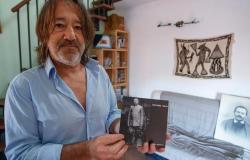Once upon a time there were grammarnazis, who will hopefully soon be replaced by «Grammancers»lovers of grammar who know its power and capacity for change. This is the title of the new book by linguist Vera Gheno (subtitle: «imagining futures with words»), which also passed through Brescia with its presentation, in the Sala del Camino of Palazzo Martinengo delle Palle. The event was organized by the Gender Commission as part of the Gender Equality Plan 2022-2024, in collaboration with the University of Brescia, which for a couple of years has been trying to use an increasingly inclusive language (with a handbook for staff, for example).
In dialogue with Simone Tempia, Vera Gheno revealed many curiosities around language, starting from anthropology and science. «In the human genome there is the ability to express oneself in words. This doesn’t mean that other species don’t communicate or aren’t intelligent, but the word allows information to be transported in space and time». Above all, the word is not granite. It is not immutable. Yet people don’t seem to accept it, even though purity doesn’t exist. In the dictionary the words derive from Latin, Arabic, English, Lombard… «The purity of the Italian lineage makes no sense: DNA says well that borders are purely human and that we are a mixture of many ethnic groups, just as languages are mixtures of dialects, Italians and other languages.”
Gheno worked for twenty years at the Accademia della Crusca and he knows what he’s talking about. Not only as a linguist, but also as someone responsible for answering people’s doubts. «The Crusca linguistic consultancy service allowed me to get in touch with the heart of the country. He receives around a hundred requests a day: people tend – at least in Italy – to have a morbid attachment to one’s own linguistic consciousness. The source of this linguistic awareness – contrasted with contemporaneity – is often “the teacher”. If the teacher said so, so it is.” The people who write to Crusca want to save the subjunctive, fight anglicisms… «I said to myself: perhaps the school is lacking in teaching elasticity». The “grammar lover” person therefore manages, unlike these grammarnazis, to have a healthy relationship with the language. «A bit like in relationships: she knows how to be non-toxic, non-abusive, non-jealous».
The meeting touched on numerous themes: the androcentric Italian linguistic system which has a gender for everything and the overextended masculine; the five usual female writers studied at school and the hundreds of male writers; the tendency to pigeonhole reality into immutable words, which is by its very nature infinite; the way the language is taught at school, which in her opinion is still very instrumental. In this regard, «logical analysis, verbs, grammatical analysis, subjunctives are carried out… What is talked about less is, for example, mobility between contexts of use. This is why there is the ‘Scuolese’, the woody language, and the ‘bella uncle’, more chewy and familiar. The ability to adapt to the context goes hand in hand with the mobility of the language. Much of linguistic happiness comes from adaptation: we don’t have to speak politely with friends, but neither do we have to be out of context when necessary. The first antidote is therefore to strengthen one’s linguistic skills.”





